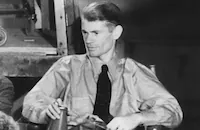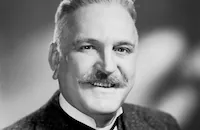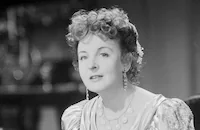Port of Seven Seas
Cast & Crew
James Whale
Wallace Beery
Frank Morgan
Maureen O'sullivan
John Beal
Jessie Ralph
Film Details
Technical Specs

Synopsis
In the port of Marseilles, France, Honore Panisse, a well-to-do sailmaker in his fifties, is enamored of the lovely Madelon, the daughter of a widowed fishmonger. For many years Panisse has played cards with Bruneau, Captain Escartefigue and tavern-owner Cesar, the father of Marius, the boy with whom Madelon is in love. Though Cesar and Marius are great friends, they argue constantly, especially over Panisse's infatuation with Madelon, whom Cesar considers one of the family. One day, Marius sends Madelon a note saying that he is going to sea for three years, but cannot say goodby in person because it would break his heart. Madelon rushes to the docks and faints as his ship sails away. Because Panisse has just arrived, he tries to carry her home, but Cesar insists on taking her himself, not realizing that Marius has gone. Panisse tries to tell him why she fainted, but cannot, and listens fretfully as Cesar tells him that the two young people will soon be married. When he tells Madelon's mother Honorine this, Madelon, now revived, tells them that Marius has gone. Despite her love, she did not stop him because she knew how much he loved the sea. One month later, As Cesar pretends not to care that Marius has not written, the postman arrives with a letter from the boy. When Madelon arrives he reads the letter aloud, saddening Madelon, who is barely mentioned. Soon Panisse goes to Honorine to ask once again for the hand of Madelon. At the same time, Madelon finds out that she is pregnant and prays that she will have the strength to tell her mother. Madelon later goes to Panisse and tells him why she cannot marry him, but he is overjoyed with the news of her pregnancy because he has always wanted a son and his late wife was never able to bear a child. Because Panisse is so kind, Madelon agrees to marry him for the sake of the little one, and when Cesar arrives, quells his anger by telling him the truth. Cesar finally relents in his anger at Panissse for "stealing" his grandchild when Panisse says that he will make Cesar the godfather. They agree to call the boy Cesar Marius Panisse. After the baby is born, he is the apple of Panisse's eye, and Madelon gains the gratitude of Panisse's aged relatives, as well as the continued devotion of Panisse. One year later, just after Panisse has reluctantly boarded the train to go to Paris on business, Marius unexpectedly shows up at his father's house, returned to France to obtain some equipment for his ship. During the night, Marius goes to see Madelon, knowing that she has married Panisse, and Madelon lies to him, saying that Panisse is asleep. Marius confesses how much he has missed her, but she tells him it's too late. When the baby cries, she goes to him and Marius realizes that the child is his. When she tearfully confesses that Panisse is actually in Paris, Marius asks her to come away with him, but she tells him to go away. Just then Cesar comes back. He has returned home because he ran into the town doctor on the train and learned that a neighbor's child has contracted scarlet fever. He tells Marius to go away because that the baby now belongs to Panisse. She wants to go away with him and the baby, but just as they are talking, Panisse comes home because he was worried about the baby. Soon Cesar arrives also and tells Marius to go, but he refuses to leave without Madelon and the baby. Though Panisse sadly says that Madelon can have her freedom, he adds that he cannot give the baby up. When Panisse goes to check on the baby, Madelon and Cesar make Marius realize that the baby belongs as much to Panisse as Marius or Madelon. When Panisse returns, Marius shakes his hand and goes away, after which Panisse and Madelon happily look at their baby's first tooth.

Director

James Whale
Cast

Wallace Beery

Frank Morgan

Maureen O'sullivan

John Beal

Jessie Ralph

Cora Witherspoon

Etienne Girardot

E. Allyn Warren

Henry Hull
Robert Spindola

Doris Lloyd

Paul Panzer
Jerry Colonna

Fred Malatesta
Moy Ming
George Humbert
Jack Latham
Crew
Karl Freund
Cedric Gibbons
Henry Henigson
Joseph Mcdonough
Gabriel Scognamillo
Douglas Shearer
Frederick Y. Smith
Preston Sturges
Dolly Tree
Slavko Vorkapich
Franz Waxman
Keith Weeks
James Whale

Film Details
Technical Specs

Quotes
Trivia
Notes
Working titles of the film include Fanny, Madelon, Life on the Waterfront and Man of the Waterfront. The film only credits the play Fanny by Marcel Pagnol as the original source material, however, some incidents within the film are based on the French films Marius (1931), directed by Alexander Korda, Fanny (1932), directed by Marc Allegret, and Cesar (1936), which Pagnol directed. All of those films were written by Pagnol and based on his own plays. According to news items and early production charts for the film, Ernest Vajda was to be the screenwriter; however, reviews and Screen Achievements Bulletin only credit Sturges with the screenplay, and Screen Achievements Bulletin specifically notes that Vajda was not to receive credit as a contributing writer on the picture.
The file on the film in the MPPDA/PCA Collection at the AMPAS Library includes portions of a screenplay written by Sturges in late 1933 or early 1934, when the story was being considered for production at Universal. July 1934 correspondence in the file mentions that the film was to be supervised by Henry Henigson at Universal, with William Wyler set to direct from Sturges' screenplay. The submitted script was rejected by Joseph I. Breen, Director of the PCA. Universal apparently decided to drop the project, and a letter sent from PCA president Will H. Hays to Paramount head Adolph Zukor implied that a film utilizing Sturges' script was later considered by Paramount. The letter also stated that it was Hays's understanding that the title of Pagnol's original play would not be used for the released film.
Information in the file, beginning on July 20, 1936, indicates that M-G-M had bought the property and was also planning to make the picture based on Sturges' script. According to a letter from Breen to M-G-M producer John W. Considine, Jr., M-G-M's submission was essentially the same as the Sturges script earlier accepted by his office. It has not been determined at what point Sturges' script for Universal was accepted. Though subsequent letters from Breen advised "caution" in presentation, its basic story was "acceptable." Few changes were suggested beyond Jul, 1936, although M-G-M was advised not to allow the baby's genitals to be exposed in the bath scene, and when the baby's temperature is taken to "be certain that there is no possibility of an inference that they are taking a rectal temperature of the child." Although the picture was approved on March 15, 1938 by Breen, subsequent to the film's release, Rev. John J. McClafferty, Executive Secretary of the National Legion of Decency wrote to Breen expressing his outrage at the picture and its "lowering the standards" which the code was supposed to uphold. McClafferty also said that the Legion of Decency had perceived a lessening of diligence on the part of the PCA. A Variety news item on May 28, 1938 speculated that the reason why the film's release was delayed for almost six months after the end of production was that the subject matter of the film was considered "dangerous" in light of the Neely Bill that was up before Congress, part of which had implications for censorship of films.
According to news items, Luise Rainer was originally scheduled to play Madelon, however, a bad cold prevented her from appearing and her role went to Maureen O'Sullivan. News items also noted that this was Henry Henigson's first production for M-G-M. In addition to the three French films mentioned above, Pagnol's trilogy was also the source for an Italian film called Fanny made in 1933, a 1934 German film entitled Der Schwarze Walfisch, a 1954 Broadway musical entitled Fanny written by Joshua Logan and S. N. Behrman, with music and lyrics by Harold Rome and a 1961 Warner Bros. film of the same name directed by Logan with Leslie Caron, Maurice Chevalier and Charles Boyer. That film was also based in part on the Broadway play, but was not a musical (see AFI Catalog of Feature Films, 1961-70; F6.1460). Though neither the 1938 film nor Preston Sturges received any onscreen credit for the 1961 Fanny, many situations and portions of the dialogue of the earlier film were contained in the latter.












